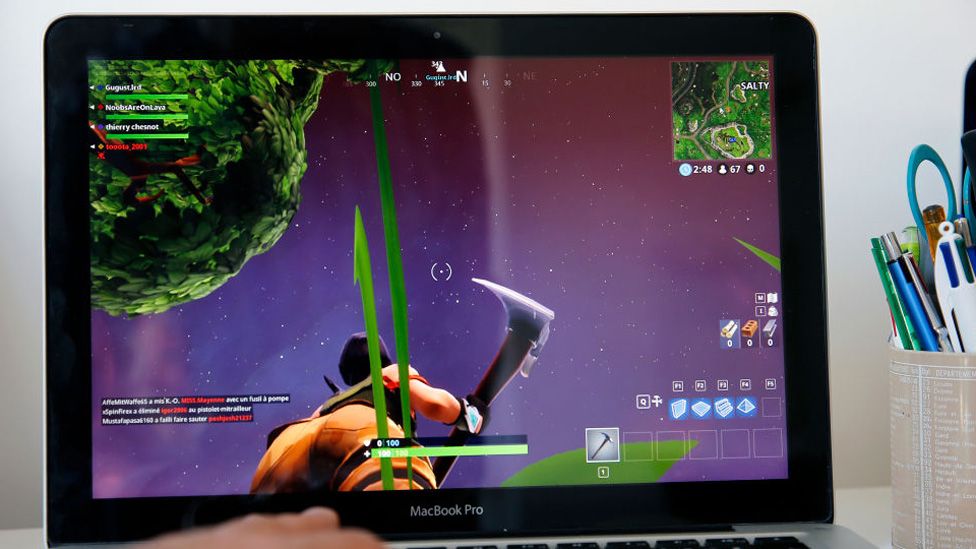Fortnite: Schools 'could learn lessons from gaming'
- Published

Techniques borrowed from video games such as Fortnite could transfer to the classroom to make lessons more engaging, says an education expert.
The survival and shooting game has proved hugely popular since it was launched in 2017.
But some primary schools in Wales have contacted parents to draw attention to guidance about the 12+ rated game.
One head teacher said some children play it late into the night which has a "huge impact on their learning".
What is Fortnite?
The most popular version of the game is the free Fortnite: Battle Royale where up to 100 players can compete against each other, fighting in an increasingly smaller area to be the last person standing.
BBC Radio 1 Newsbeat's gaming reporter Steffan Powell said the game had been "a huge runaway hit".
"It's free to play, you add some cartoony graphics in there, easy to pick up and play controls and also the fact that the people behind the game are constantly tweaking it and changing it, giving players something new to try out all the time," he said.
"And then you've got YouTubers, influencers and twitch streamers playing it all the time, sharing their experiences with people all across the world.
"And that's why so many people have really taken Fortnite to their hearts and why they go home every night after school or after work and play it for a couple of hours."
What do the teachers say?
Laura Perrett, of Llantarnam Community Primary School in Cwmbran, Torfaen, is one of several head teachers who have highlighted advice about the game in school newsletters or on twitter feeds.
"I would say it's massive at the moment," she said.
"We're hearing lots and lots and lots about it in school. It's definitely a craze that's sweeping through I'd say Key Stage 2 - seven plus.
"The advice is age 12 plus which is not primary age children so because of that we just put out notices to parents to advise them to ensure they know what they're allowing their children to go on and play.
"If they are allowed on to it late into the night and they come in tired, lacking concentration - that has a huge impact on their learning."
She added: "If they're obsessed with it and that's all they talk about and think about that can have an impact. So there are those sides of things that do filter into school and cause an effect."
What do the children say?
These 10-year-olds give their verdict on the game - and the dances that have come from it
Ejiro, 10, said: "You can have fun and play and you can express yourself in a game. I think it's suitable - maybe younger than eight is not good because there's a little bit of stuff in there but otherwise it's fine."
Gavin, also 10, said: "Because all of us are best friends, we like to discuss what we're playing and like to talk about it."
Connor, 10, says he plays it almost every day, adding: "We learn about online safety but you just play - people can't hear you, they don't know where you are."
And the expert?
Prof Paul Howard Jones says video gaming is part of adolescence but it is all about how we use technology
Paul Howard Jones, a former Estyn school inspector, is a professor of neuroscience and education and has been researching the role of technology, including in gaming, in education.
He says there has been a "demonising of technology" and while it is important to be aware of the negatives, he says "it's not the technology, it's the way that you use it".
Some aspects of gaming could actually play a positive role in education, he said.
"There are little aspects of games that you can borrow and insert into lessons to make lessons more engaging and more likely to give rise to learning."
How could gaming help in the classroom?
University researchers have been experimenting with some of those approaches in Year 8 classes in schools in Wales.
That has involved asking the children to answer questions - but instead of getting a point for a correct answer, a wheel of fortune spins and they either get two points or no points at all.
"They prefer that, they find that very engaging, it's very exciting," said Prof Jones.
"And that's basically turning something into more like a computer game where you've got this rapid schedule of uncertain rewards."
And beyond schools?
One Welsh MP said government and therefore public services were also lagging behind young people's use of technology.
Ogmore MP Chris Elmore is leading an All-Party Parliamentary Group on Social Media and Young People's Mental Health.
"We have to have that conversation as adults, as teachers. as educational professionals to say this is a growing area of technological advancement," he said.
"And government across the piece isn't moving quickly enough and with that comes schools, educators, health workers that are equally not as in tune with a whole generation of young people that are using these platform and games>"
- Published19 July 2018
- Published19 July 2018
- Published29 March 2018